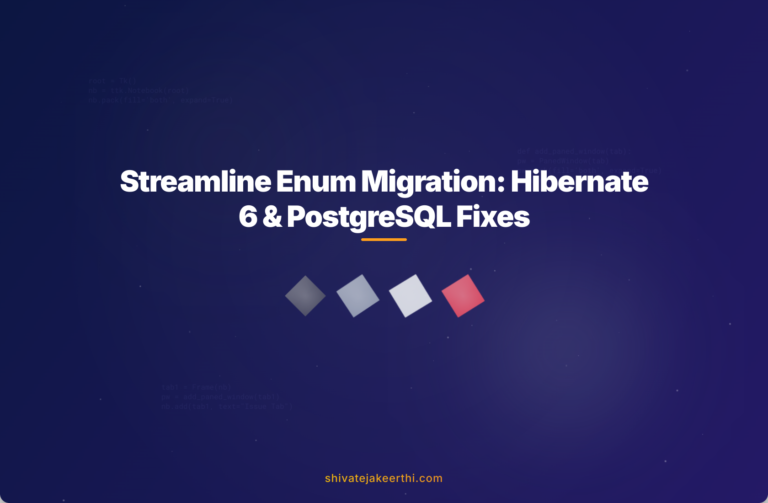Migrating applications to Hibernate 6 can unlock significant performance improvements and new features—but it’s not always smooth sailing. When working with enums, especially in a Micronaut project using PostgreSQL, developers frequently stumble upon enum mapping pitfalls.
If you’ve started migrating your Micronaut application’s Hibernate version from 5.x to 6.x, chances are you encountered some enum mapping issues, specifically with PostgreSQL enum types.
Before we dive deeper, let’s briefly examine how many developers originally configured their enum mappings in Hibernate 5.
Previous Entity Annotation and Enum Field Definition
In Hibernate 5.x, mapping custom enums with PostgreSQL types often involved using the @TypeDef and @Type annotations from Hibernate. Consider an example entity:
@Entity
@TypeDef(
name = "pgsql_enum",
typeClass = PostgreSQLEnumType.class
)
@Table(name = "book")
public class Book {
@Id
private UUID id;
@Enumerated(EnumType.STRING)
@Type(type = "pgsql_enum")
@Column(name = "status", columnDefinition = "book_status_enum")
private StatusEnum status;
// getters & setters
}
The corresponding enum in Java looked something like this:
public enum StatusEnum {
AVAILABLE,
CHECKED_OUT,
RESERVED
}
Then, you’d define your PostgreSQL enum type in the database schema:
CREATE TYPE book_status_enum AS ENUM ('AVAILABLE', 'CHECKED_OUT', 'RESERVED');
This approach was straightforward and stable for Hibernate 5 applications.
However, during migration to Hibernate 6, developers started facing confusing errors related to mismatched database types.
Common Errors After Migration to Hibernate 6
One frustrating error developers reported upon migrating was:
operator does not exist: book.book_status_enum = character varying
Or occasionally, you’d see the integer variant of the same issue:
operator does not exist: book.book_status_enum = integer
Such errors can be discouraging, especially since they occur on operations previously working smoothly before migration. But why does this happen?
Hibernate 6 modified various internals relating to data type management and Jdbc type instructing, so the traditional custom enum mappings you’ve used before no longer apply seamlessly.
Attempted Solutions That Didn’t Work
As you dig around on forums or even ask questions on sites like Stack Overflow, you’ll find many developers encountering this problem have already tried multiple solutions like:
- Using standard JPA annotations: Attempting to rely exclusively on @Enumerated(EnumType.STRING).
- Custom Jakarta Converters: Implementing custom converter classes (AttributeConverter) to manually map enums to database values.
- @JdbcTypeCode and Hibernate Types: Utilizing the latest annotation features such as @JdbcTypeCode(SqlTypes.ENUM) in conjunction with Hibernate’s built-in PostgreSQLEnumType class provided in Hibernate 6.
- Specified explicit column definitions like: @Column(columnDefinition = “book_status_enum”) to clarify and force the type explicitly.
Surprisingly, despite all these attempts, the issue persisted. Why?
The persistent underlying issue is that Hibernate 6 necessitates explicit handling of PostgreSQL enums differently than before. Old strategies won’t automatically work due to Hibernate’s stricter JDBC type enforcement and internal changes in its type system.
Why These Solutions Still Fail
In Hibernate 5, custom user-defined (postgres-enum) mappings leveraged custom Hibernate-specific tutorials (like Vlad Mihalcea’s guide with the custom enum mapping).
With Hibernate 6, the framework introduced stricter JDBC type expectations, and previous generic string-based or converter-based solutions no longer suffice. PostgreSQL expects enum types declared directly, and mapping enums requires explicit usage of newer Hibernate APIs explicitly targeting JDBC-level support introduced in Hibernate 6.
Thus, revisiting your previous migration strategy explicitly is imperative.
Correct Mapping of Enums in Hibernate 6 (Micronaut + PostgreSQL)
To properly map enums to PostgreSQL types in Hibernate 6 within a Micronaut project, follow these clear steps:
-
Ensure PostgreSQL ENUM type is defined clearly:
CREATE TYPE book_status_enum AS ENUM ('AVAILABLE', 'CHECKED_OUT', 'RESERVED'); -
Adjust your entity class to match the new Hibernate 6 annotations clearly:
Remove @TypeDef definitions and old custom type handling annotations. -
Utilize Hibernate 6’s @JdbcTypeCode and @Enumerated(EnumType.STRING) correctly:
Here’s the corrected entity implementation:
@Entity @Table(name = "book") public class Book { @Id private UUID id; @Enumerated(EnumType.STRING) @JdbcTypeCode(SqlTypes.NAMED_ENUM) @Column(name = "status", columnDefinition = "book_status_enum") private StatusEnum status; // getters & setters } -
Register PostgreSQL enum type within Hibernate Dialect if needed: For some projects configured with special Dialects, registering PostgreSQL enum can help Hibernate properly recognize types during startup explicitly like below:
public class PostgreSQLDialectEnum extends PostgreSQLDialect { public PostgreSQLDialectEnum() { super(); this.registerHibernateType(Types.OTHER, "pg_enum"); } }
Implementing these steps resolvingly addresses the “operator doesn’t exist” errors. Hibernate now has explicit instructions on representing and mapping JDBC enum types directly to PostgreSQL.
Best Practices for Future-Proof Enum Mapping in Micronaut + Hibernate 6 Stack
Consider the following tips to simplify future migrations and catch issues proactively:
- Always explicitly define your PostgreSQL ENUMs and maintain a one-to-one mapping with Java enums.
-
Avoid generic
varcharor numeric solutions for enum if possible; use database enum types to leverage index optimizations and validation on the database side. - Clearly document each custom enum type in database migrations for transparency and improved team collaboration.
- Carefully test schema migrations when updating Hibernate major versions like Hibernate 6 through automated integration tests.
Taking these proactive measures eases upcoming migrations, reduces downtime, and increases confidence in your database-integration policies.
When migrating to Hibernate 6, enum mapping issues may appear challenging initially. Yet, with thoughtful attention and Hibernate 6’s robust built-in solutions, achieving stable PostgreSQL enum mappings is entirely possible.
Have you faced challenges during Hibernate 6 migration? Are there other techniques you’ve found particularly helpful? Feel free to share your thoughts or learn more in related JavaScript articles that discuss coding practices relevant to such migrations.



0 Comments